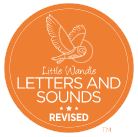Reading
Reading at home
At Kingswood Primary Academy, we give all children the opportunity to enter the magical world of books as we promote reading for pleasure as part of our reading curriculum. Children are encouraged to develop their own love of genres and authors and to review the books they have read. This enhances a love of literature across a range of genres and styles. This will, in turn, support children to produce written work, in all areas of the curriculum.
We aim to develop our pupils into confident, fluent readers who enjoy reading. In the early years and year 1, children follow the Little Wandle phonics scheme in order to build secure phonics and fluency skills. Throughout the rest of the school, our reading is taught through discussion-based whole class reading sessions, independent reading and comprehension lessons.
We expect our children to read at home at least 3 times a week. Reading at home is a vital part of education as it builds a wealth of vocabulary as well as supporting retrieval and inference questioning.
Tips to support your children with reading at home:
- Set reading time aside and ensure you have no distractions when reading.
- Ask your child to choose a book as it will support children’s recommendations and the idea of book talk.
- Discuss the illustrations, as this will support inference questioning.
- Encourage your child to talk about the book.
- Make it fun! Read in a funny voice, have a prop or show different actions.
Big Cat Collins Books
At KPA we use Big Cat Collins books. These are both phonics based (Little Wandle phonics programme) and colour banded to provide complete support as children progress in their reading. During their time at school they will become fluent readers enabling them to hear, share and read through hundreds of high-quality fiction and non-fiction books by award winning authors and illustrators. In-depth teaching resources are used to develop and assess key reading skills at all stages from early reading through to phonics, guided, whole-class and independent reading for more confident readers.
 Intent:
Intent:
Reading underpins all areas of the curriculum and is a key skill for learning and understanding throughout life. Reading lessons ensure that children are able to read fluently and securely at an age-appropriate level, as well as comprehending the texts that they are able to read independently. Children in the early years and year 1 begin their reading journey by developing secure phonics skills, which enable them to decode confidently. Through high-quality, engaging texts, children are exposed to higher-level vocabulary in context. Children are supported in developing a love of reading for pleasure, which will continue beyond their time at Kingswood Primary Academy. We believe that reading is key to developing empathy, understanding and tolerance, and so children share high-quality texts which expose them to a broad range of themes and allow them to gain a deeper understanding of the world around them.
 Implementation:
Implementation:
Pupils in reception and year 1 receive daily phonics lessons focusing on decoding and reading fluency, following the Little Wandle scheme. Where appropriate, this continues into year 2. Children are regularly assessed to ensure that they remain on track, and where children are at risk of falling behind interventions are put into place to address any gaps. Children are provided with books which closely match their phonics ability, which they read in class guided reading sessions and at home.
From years 2 – 6, children receive daily reading lessons. These include:
-
Independent reading sessions: children independently read books which are closely matched to their ability. Adults regularly listen to each child read. Children take these books home to read with an adult.
-
Whole class reading sessions: a high-quality text is shared by the whole class. In these lessons, the teacher reads aloud to provide a good model of reading, while children follow along with the text. Rich discussions about the text are carried out, led by the children and using a range of reading skills in order to promote good understanding and enjoyment of reading.
-
Reading comprehension sessions: the children develop secure comprehension skills to ensure that they are able to draw meaning from the texts they are reading independently.
A positive reading culture is built around the school. Each class visits the library weekly, and children are encouraged to choose and share books which they are interested in. In all classes, teachers lead daily story times. Events such as World Book Day spotlight reading, and parent engagement sessions are planned throughout the year.
Around the school, you will find reading areas for the children to access. Subject specific books will be found in the classroom to support vocabulary and knowledge based learning.
A timetable is in place for all classes to visit the school library once a week. Whilst in the library, they are able to read for pleasure, ask and answer questions and listen to an adult read.
The Academy Reading Ambassadors promote a reading culture throughout the school; they help in the library, choose and sort books, share ideas and share their favourite stories.
 Impact:
Impact:
We measure the impact of our curriculum through the following methods:
-
Regularly assessing children’s phonics attainment through Little Wandle assessments and phonics screening checks
-
Regularly listening to each child independently read and matching books which are appropriate for their level
-
Using PiXL assessments to assess the children’s comprehension skills
-
Tracking children’s reading ages using FFT assessments
-
Discussing books which the children are reading to discover children’s personal preferences, and encouraging children to carry out discussions about books with their peers
Attainment in reading is measured using the statutory assessments at the end of EYFS, KS1 and KS2, as well as this termly assessments take place as a way of monitoring children’s progress and development and identifying children who need to be further supported to keep up.


